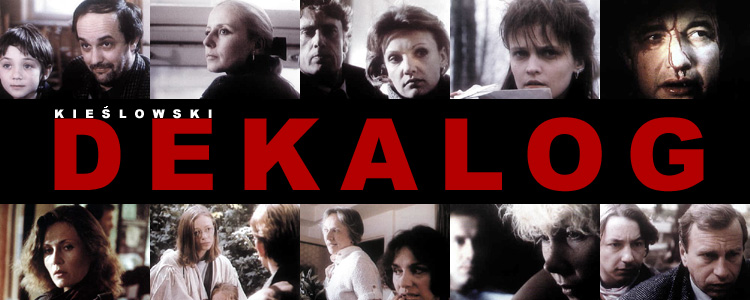
My favourites are Dekalog 2 (a doctor forced to play God), 3 (a woman finding an excuse to spend Christmas’s Eve with a former lover), 4 (the incest story), 6 (a young man falling in love with the neighbour he spies on—A Short Film About Love) and 9 (a wife breaking off with a young lover and finding out that her husband spies on her). None of the episodes is bad. Dekalog 1 is a lovely film, not as subtle and ambiguous as the aforementioned episodes, but it’s a nice introduction to some of the themes of the whole series—uncertainty in life, the unpredictability and complexity of life, the meaning of life, and so on. Dekalog 5, which was to become A Short Film About Killing, is acclaimed, perhaps rightfully so—it’s not a favourite simply because either it’s slightly outdated or because I’ve seen films and read works that compare murder and capital punishment before. Many people still find it powerful and haunting. Dekalog 7 and 8 have the similar problem of lacking visuals—Dekalog 7 relies on explanatory dialogue that sometimes sounds unnatural and Dekalog 8 feels more like a play or a meditation on moral decisions than a film, but both are interesting and thought-provoking. Dekalog 10 is a very good film, in which Kieslowski again shows his skills as a director, his understanding of psychology, and his moral view (that the brothers in the end reconcile and come to an understanding is more important than their father’s stamps; and the “loss” of a kidney is not a loss because it saves somebody), and it’s a nice way to end the series. Personally I’m just not very satisfied with the ending because whilst it’s true that the good relationship between the brothers is something money can’t buy, I’m annoyed when frauds succeed, though that comment is a reflection on my personal feelings rather than the film itself.
As a film lover, I love and admire Kieslowski. He’s 1 of the greatest directors of all time. It is Blue, Red and The Double Life of Veronique that demonstrate best his mastery of visual storytelling and ability to depict on screen his characters’ states of mind (Blue is perhaps his most “internal” film), but in Dekalog, we can see Kieslowski’s understanding of psychology and ability to get the best out of his actors, the subtlety and focus on details, the importance of every shot (visual clues, symbols), etc. Kieslowski shows what film can do as a medium, he’s also profound. Dekalog makes me see a lot more clearly how “shallow” many acclaimed directors are—they may be brilliant and very talented, and may make very good films, but their films lack depth and ultimately say nothing.
I also like him on a personal level. It’s hard to explain why I now feel more of an affinity with him than with the superior Fellini, but Red and The Double Life of Veronique made me feel intensely alive and more aware of my surroundings, and Dekalog… well I’ve written enough about Dekalog.
As a film student, I see Kieslowski as an important influence and a great master to learn from.
It’s a pity that most people now are unfamiliar with Kieslowski’s works or, worse, haven't heard of his name.
No comments:
Post a Comment
Be not afraid, gentle readers! Share your thoughts!
(Make sure to save your text before hitting publish, in case your comment gets buried in the attic, never to be seen again).